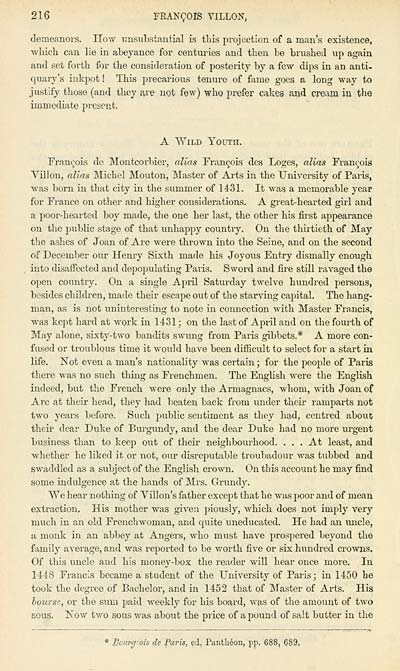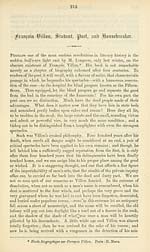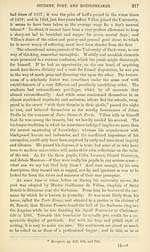Non-Fiction > Uncollected essays > Volumes 33-38, 1876-1878 - Cornhill magazine > Volume 36
(16) Page 216
Download files
Complete book:
Individual page:
Thumbnail gallery: Grid view | List view

216 FRANgOIS VILLON,
clemeanoi's. How unsuLstautial is this projection of a man's existence,
whicli can lie in abeyance for centui-ies and then be brushed up again
and set forth for the consideration of posterity by a few dips in an anti-
quary's inkpot ! This precarious tenure of fame goes a long way to
justify those (and they ai'C not few) who prefer cakes and cream ia the
immediate present.
A Wild Youth.
Fran^'ois do Montcorbier, alias Fran9ois des Loges, alias Frani^ois
Villon, alias Michel Mouton, Master of Arts in the University of Paris,
■was born in that city in the summer of 1431. It was a memorable year
for France on other and higher considerations. A gi-eat-hearted girl and
a poor-hearted boy made, the one her last, the other his first appearance
on the public stage of that unhappy country. On the thiitieth of May
the ashes of Joan of Arc were thrown into the Seine, and on the second
of December our Henry Sixth made his Joyous Entry dismally enough
into disaffected and depopulating Paris. Sword and fire still ravaged the
open coimtry. On a single April Saturday twelve hundred persons,
besides children, made their escape out of the starving capital. The hang-
man, as is not uninteresting to note in connection with Master Francis,
was kept hard at work in 1431 ; on the last of April and on the fourth of
May alone, sixty-two bandits swung from Paris gibbets.* A more con-
fused or troublous time it would have been difficult to select for a start in
life. Not even a man's nationality was certain ; for the people of Paris
there was no such thing as Frenchmen. The English were the English
indeed, but the French were only the Armagnacs, whom, with Joan of
Arc at their head, they had beaten back from under their ramparts not
two years before. Such public sentiment as they had, centred abouc
theii' dear Duke of Burgundy, and the dear Duke had no more urgent
business than to keep out of their neighbourhood. ... At least, and
whether he liked it or not, our disreputable troubadour was tubbed and
swaddled as a subject of the English crown. On this account he may find
some indulgence at the hands of Mi's. Grundy.
We hear nothing of Villon's father except that he was poor and of mean
extraction. His mother was given piously, which does not imply very
much in an old Frenchwoman, and quite uneducated. He had an imcle,
a monk in an abbey at Angers, who must have prospered beyond the
family average, and was reported to be worth five or six hundred crowns.
Of this uncle and his money-box the reader will hear once more. In
1448 Francis became a student of the University of Paris; in 1450 he
took the degree of Bachelor, and in 1452 that of Master of Arts. His
bourse, or the sum paid weekly for his board, was of the amount of two
sous. ISTow two sous v^as about the price of a pound of salt butter in the
* Bcupfj^ois de Paris, ed, Pantheon, pp. 688, 689,
clemeanoi's. How unsuLstautial is this projection of a man's existence,
whicli can lie in abeyance for centui-ies and then be brushed up again
and set forth for the consideration of posterity by a few dips in an anti-
quary's inkpot ! This precarious tenure of fame goes a long way to
justify those (and they ai'C not few) who prefer cakes and cream ia the
immediate present.
A Wild Youth.
Fran^'ois do Montcorbier, alias Fran9ois des Loges, alias Frani^ois
Villon, alias Michel Mouton, Master of Arts in the University of Paris,
■was born in that city in the summer of 1431. It was a memorable year
for France on other and higher considerations. A gi-eat-hearted girl and
a poor-hearted boy made, the one her last, the other his first appearance
on the public stage of that unhappy country. On the thiitieth of May
the ashes of Joan of Arc were thrown into the Seine, and on the second
of December our Henry Sixth made his Joyous Entry dismally enough
into disaffected and depopulating Paris. Sword and fire still ravaged the
open coimtry. On a single April Saturday twelve hundred persons,
besides children, made their escape out of the starving capital. The hang-
man, as is not uninteresting to note in connection with Master Francis,
was kept hard at work in 1431 ; on the last of April and on the fourth of
May alone, sixty-two bandits swung from Paris gibbets.* A more con-
fused or troublous time it would have been difficult to select for a start in
life. Not even a man's nationality was certain ; for the people of Paris
there was no such thing as Frenchmen. The English were the English
indeed, but the French were only the Armagnacs, whom, with Joan of
Arc at their head, they had beaten back from under their ramparts not
two years before. Such public sentiment as they had, centred abouc
theii' dear Duke of Burgundy, and the dear Duke had no more urgent
business than to keep out of their neighbourhood. ... At least, and
whether he liked it or not, our disreputable troubadour was tubbed and
swaddled as a subject of the English crown. On this account he may find
some indulgence at the hands of Mi's. Grundy.
We hear nothing of Villon's father except that he was poor and of mean
extraction. His mother was given piously, which does not imply very
much in an old Frenchwoman, and quite uneducated. He had an imcle,
a monk in an abbey at Angers, who must have prospered beyond the
family average, and was reported to be worth five or six hundred crowns.
Of this uncle and his money-box the reader will hear once more. In
1448 Francis became a student of the University of Paris; in 1450 he
took the degree of Bachelor, and in 1452 that of Master of Arts. His
bourse, or the sum paid weekly for his board, was of the amount of two
sous. ISTow two sous v^as about the price of a pound of salt butter in the
* Bcupfj^ois de Paris, ed, Pantheon, pp. 688, 689,
Set display mode to: Large image | Transcription
Images and transcriptions on this page, including medium image downloads, may be used under the Creative Commons Attribution 4.0 International Licence unless otherwise stated. ![]()
| Early editions of Robert Louis Stevenson > Non-Fiction > Uncollected essays > Cornhill magazine > Volume 36 > (16) Page 216 |
|---|
| Permanent URL | https://digital.nls.uk/78693528 |
|---|---|
| Description | Wild youth |
| Dates / events: |
1877 [Date/event in text] |
|---|---|
| Subject / content: |
Volumes (documents by form) |
| Person / organisation: |
Stevenson, Robert Louis, 1850-1894 [Contributor] |
| Form / genre: |
Written and printed matter > Periodicals |
|---|---|
| Dates / events: |
1860-1975 [Date published] |
| Places: |
Europe >
United Kingdom >
England >
Greater London >
London
(inhabited place) [Place published] |
| Subject / content: |
Fiction Journals (periodicals) Short stories |
| Person / organisation: |
Smith, Elder, and Co. [Publisher] |
| Description | Essays and reviews from contemporary magazines and journals (some of which are republished in the collections). 'Will o' the Mill', from Volume 37 of the 'Cornhill Magazine', is a short story or fable. |
|---|
| Person / organisation: |
Stevenson, Robert Louis, 1850-1894 [Author] |
|---|



